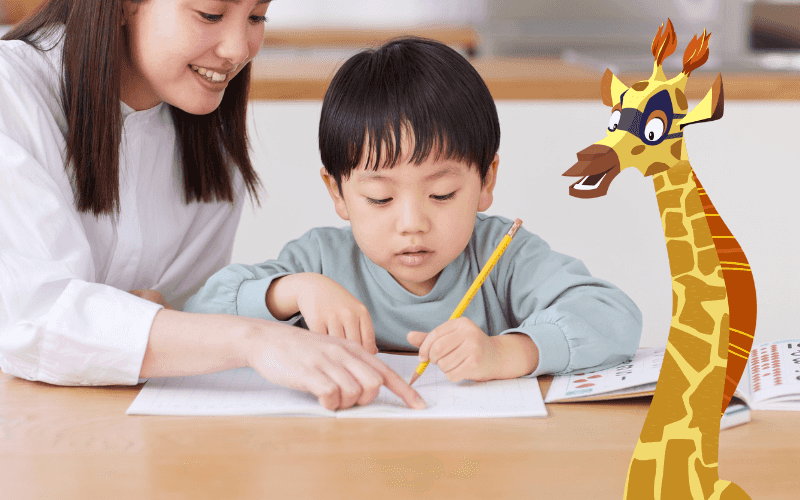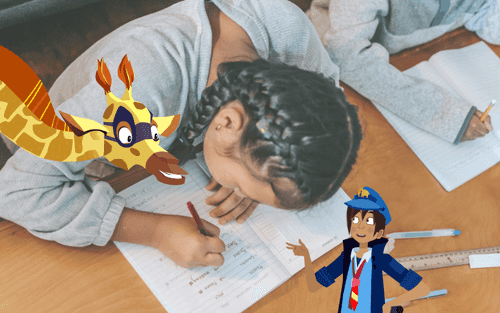How to Help a Child Who Is Struggling with Writing


We use writing everyday for expressing thoughts, emotions, and creativity, so it's an important skill to build from an early age. However, it’s perfectly normal for writing to feel tricky at first, whether it’s forming letters, finding the right words, or dreaming up that first magical idea. Some children may also face challenges like dyslexia, dyspraxia, or dysgraphia, which can add a few extra bumps along the way.
Here’s the main thing to remember: with patience, creativity, and a cheerleader by their side (aka you!), your child can build their confidence and discover the magic of writing. Let’s explore some ways to support them along the way!

Observe where they're struggling
Before jumping into solutions, it’s important to take a step back and observe. When your child sits down to write, where does the challenge appear?
Maybe they:
- Find it hard to grip a pencil comfortably.
- Tire quickly when writing by hand.
- Struggle to get started, even when they have great ideas.
- Lose track of what they want to say halfway through a story.
- Become frustrated when spelling or grammar doesn’t come easily.
Noticing these small details can give you important clues about what kind of support your child might need. By understanding the “why” behind the struggle, you’re already taking the first big step toward helping them!
Encourage them to be confident
Writing can feel intimidating and deflating, especially when mistakes happen along the way. That’s why a big part of supporting a struggling writer is boosting their confidence and helping them believe in their abilities.
Start by creating a safe, encouraging space where effort is celebrated just as much as results. Notice and praise small accomplishments such as:
- Finishing a sentence.
- Trying new vocabulary.
- Sharing an idea out loud.
Positive phrases like "Wow, that's such a creative idea!" or "You should be really proud of how much you've written!" remind children of their progress. Remember, it’s not about perfect spelling or grammar right now—it’s about building the belief that they can write, and that their ideas are important.
You don't need to wait for a polished, perfect story before celebrating. Every small step is a victory! Show your child the value of their writing by hanging it on the fridge, sharing it with family members, or creating a writing board where all their amazing work is proudly displayed.
Getting your child to write daily can make it less daunting and there are lots of fun ways to sneak it in! Try encouraging them to write little notes for family members, getting them to help you create the shopping list, or even asking them to keep a daily diary of their mini adventures (yes, even writing about lunch counts!).
If your child feels frustrated, it's okay! Let them know that even grown ups sometimes find writing hard. You could say something like, "Every writer struggles sometimes, but you’re getting better with every word you write". Helping children see mistakes as a normal and fundamental part of learning can make a huge difference in their attitude toward writing.
Use tools to make writing easier
When writing feels physically uncomfortable or mentally overwhelming, the right tools can make all the difference.
For physical difficulties:
- Try different types of pencil grips or ergonomic pens to make holding writing tools more comfortable.
- Use ruled paper so that the page layout is clear.
- Allow typing on a keyboard or tablet if handwriting feels challenging.
- Use sloped writing surfaces or clipboards to improve writing posture.
For creating and organizing ideas:
- Break down writing tasks into smaller, bitesize steps. For example, instead of “write a story," start with "think of a character" or "describe a setting".
- Brainstorm together! Use colorful mind maps or fun graphic organizers like flow charts or spider charts to help children plan out their ideas visually.
- Offer fun writing prompts. A question like, "What superpower would you have for a day?" can unlock tons of imagination without the pressure of coming up with an idea from scratch.
When children have the right tools, writing becomes less about struggling and more about creating - and that's where the magic begins.
Make it fun!
At Night Zookeeper, we believe that writing should never feel boring or stressful—it should be a journey full of imagination, color, magic and excitement! When writing time feels like playtime, children are naturally more willing to engage and explore.
Here are some playful ways to make writing fun:
Use colorful stationery and supplies
Unleash creativity by switching out your usual writing materials for colorful pencils, glittery pens, bright markers, paints, crayons, chalk - the list goes on! You can write on card, cardboard, colured paper, chalkboards, whiteboards, or even fabric. The combinations are endless - who says you can’t scribble a poem on a pumpkin? Giving your child a variety of fun writing tools is an easy way to make writing more interactive and playful. It can make even the most reluctant writers excited to pick up their pens.
Mix writing with art
Writing doesn’t have to be limited to words—it can come to life through drawing, coloring, and crafting too! We all know that picture books are a great tool to help children with reading, but did you know that creating them could also help your child's writing? Encouraging your child to turn their stories into homemade scrapbooks or storybooks with accompanying illustrations is a great activity to break down the 'chore' of writing. They can draw characters, design maps of fantasy lands, or create comic strips to go alongside their writing. When children can see their ideas unfold through art, it adds a whole new layer of wonder and helps bring their words to life.
Turn writing into a game!
Who said ‘work hard play hard’ can’t all be done at once? Games are a magical way to make learning stick - because when kids are having fun, they become more eager and curious to explore new ideas! Educational games can turn writing into an exciting challenge rather than an intimidating task. Whether it’s rolling dice to build a story, solving riddles with friends, or unlocking writing challenges in a digital world like Night Zookeeper, learning through play helps children to build real skills in a fun, low pressure way.

Our program is packed with thousands of writing games, challenges, and competitions that have inspired millions of children around the world to fall in love with writing! With Night Zookeeper, your child will create their own unique characters and power through fun games, interactive lessons, and exciting writing prompts. As they progress, they’ll build their own Night Zoo and unlock new areas of the map, making every writing milestone a new adventure!
Your child can get started with a 7 day FREE trial:
If you have any questions feel free to email us at [email protected].
Follow us on social media:


Make Reading & Writing Fantastically Fun!
- Award-winning reading & writing program for kids
- Improves spelling, grammar, punctuation & vocabulary
- Over 1,000 different learning games and activities


“My child hates writing.” What do I do?


Why is Writing Important for Children?


8 Fantastically Fun Writing Games


